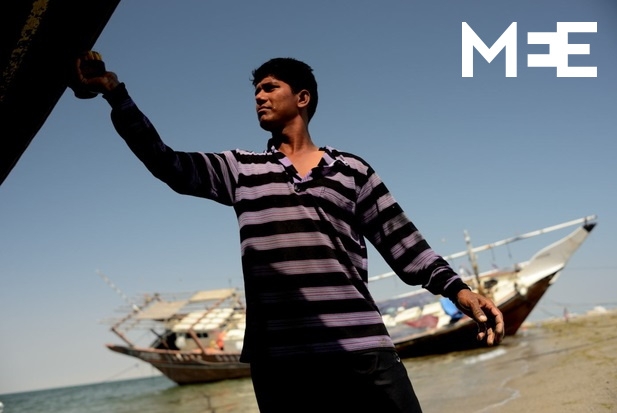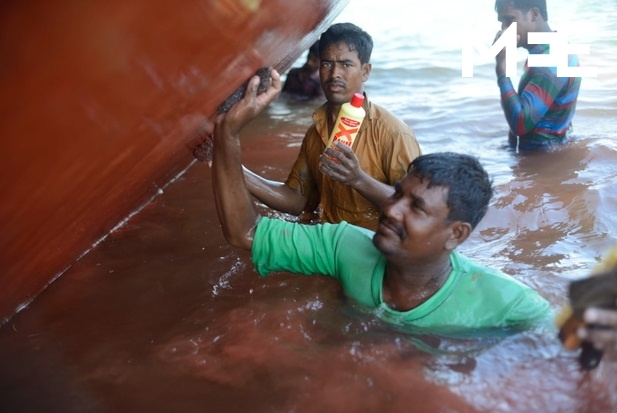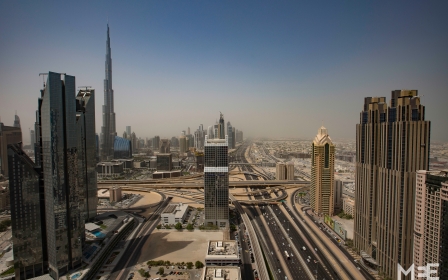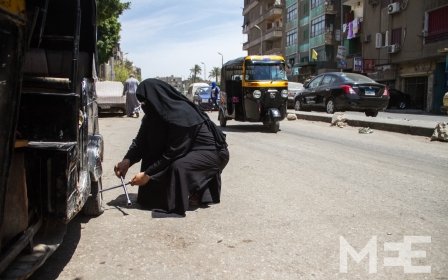The boat cleaners of Oman's Masirah Island
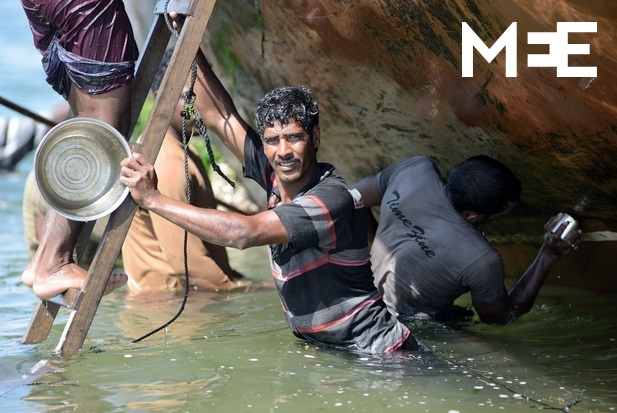
As one of the oil-rich countries of the Gulf Cooperation Council, Oman is still undergoing vast and rapid development. This expansion, including the protracted construction of a major new airport in Muscat, needs a growing workforce, which is mostly drawn from poorer Asian countries.
The great majority of expat workers in the Sultanate are from India, Bangladesh and Pakistan. According Omani government data for August 2015, there are 641,000 Indian, 561,000 Bangladeshis and 216,000 Pakistanis out of a total 1.631m expat workers. This compared to just 206,000 Omanis working in the private sector.
In recent years, the government has intensified efforts to increase Omani employment in the private sector, a policy called “Omanisation,” by adding new job categories in which only Omanis can be employed.
Within the country there are undoubtedly tensions between the nationals, who make up just over half the population, and the expatriates. The demographic shift brought about through rising expat labour has led to efforts by the government to stem the flow of new workers arriving in the country.
Some fear that Oman, where a majority (2.2 million) are nationals compared to an expat population of 1.7 million, could become like UAE or Kuwait, where locals are a minority.
There is an ongoing debate over the country’s labour law and the minimum wage, introduced by ministerial decree in 2013, which is only applicable to nationals. Unions were only legalised in Oman in 2006.
While Omanis have seen big increases in the minimum wage since its introduction, migrant workers have been left out. “Bringing in a system [of minimum wages for migrant workers] can improve the entire labour system in Oman,” Mohammed al-Khaldi, board member of General Federation of Oman Trade Union (GFOTU), told the Times of Oman recently.
Photographer Jerzy Wierzbicki has been taking pictures of Oman’s Asian expat workers since he first moved to the country in 2007, in the capital Muscat but also in far flung parts of the country.
“During the years I spent in Oman, I often encountered workers from India, Bangladesh or Pakistan in the most remote locations, including the desert,” he said.
“The vast majority of this low-paid workforce is employed in low-skilled, hard physical work. Salaries depend on the job type and, also, the worker’s country of origin. People from India usually are better paid than those from Pakistan and Bangladesh.”
"Many of the workers were from two major cities in Bangladesh, Chittagong and Dhaka, and can be found everywhere in Oman, often doing the most dangerous work."
Earlier this year he visited Masirah Island, off the coast of Oman, which is a long and lonely drive from Muscat to the Shennah ferry harbour.
The first ferryboat leaves at sunrise and after around an hour’s trip reaches the island’s coastline. Masirah Island is the largest offshore island in the Sultanate, and is home to a large US military base Camp Justice, strategically located near Iran and the Gulf.
Wierzbicki was not here to visit the base. Just opposite the ferry harbour is a small town called Ras Al Hilf, a stop off point for fuel and basic supplies. “On this trip I had a different plan. A Bangladeshi friend from Muscat told me about the people working in the fishing port in Masirah Island.”
Several traditional dhow fishing boats are located a few kilometres from the ferry harbour. These are the same boats that have plied the Gulf waters for centuries and once made Oman the centre of a maritime empire.
Working on two boats was a group of Bangladeshi workers, whose job it was to clean the hulls and remove the algae, which had covered a huge part of the broadside of the boats. The cleaners were using simple tools – a brush or just empty tin cans. Asked how much they are paid, one worker replies simply “Okay.”
“”They worked quickly and efficiently, and are skilled at the job,” said Wierzbicki.
The workers said they were from Chittagong, which is one of the world centres of the ship salvage industry. Unlike in Europe, where there are special salvage shipyards, the work is done directly on the beach.
“The boat cleaners from Masirah are exactly the same people, accustomed to work in hard conditions and very often in dangerous situations.”
It is unlikely that any locals will be found with either the desire or skills to replace these workers any time soon.
New MEE newsletter: Jerusalem Dispatch
Sign up to get the latest insights and analysis on Israel-Palestine, alongside Turkey Unpacked and other MEE newsletters
Middle East Eye delivers independent and unrivalled coverage and analysis of the Middle East, North Africa and beyond. To learn more about republishing this content and the associated fees, please fill out this form. More about MEE can be found here.


